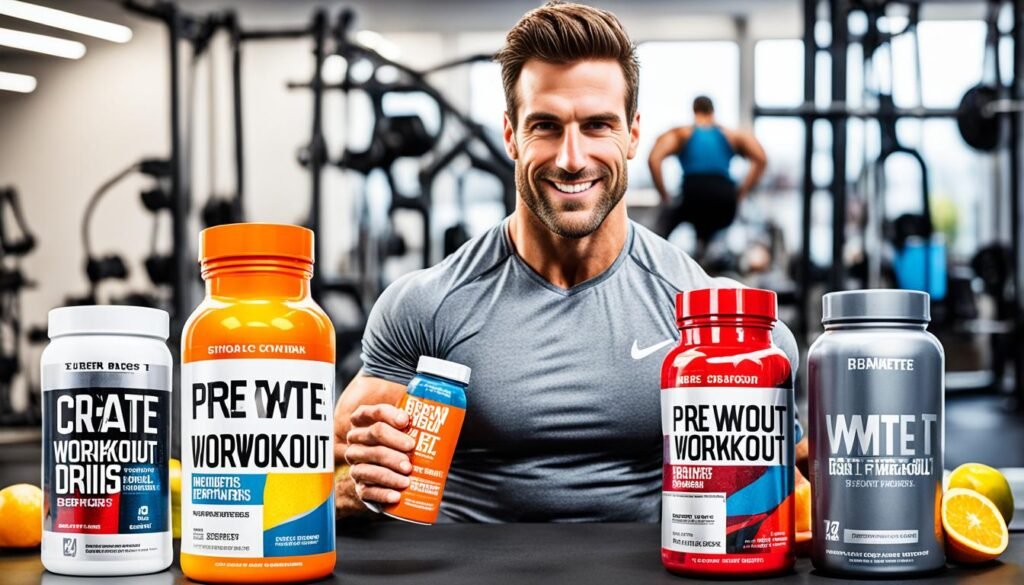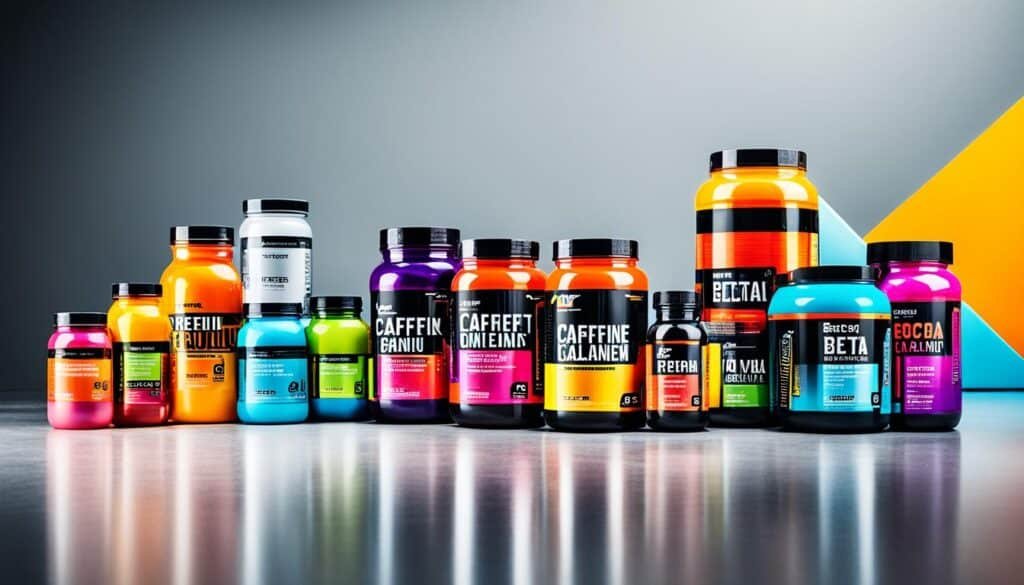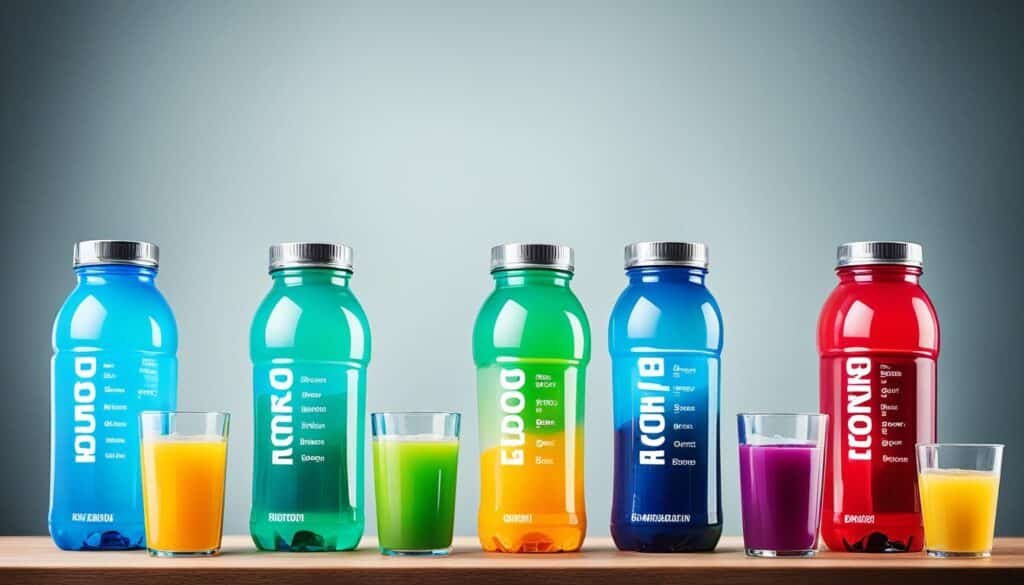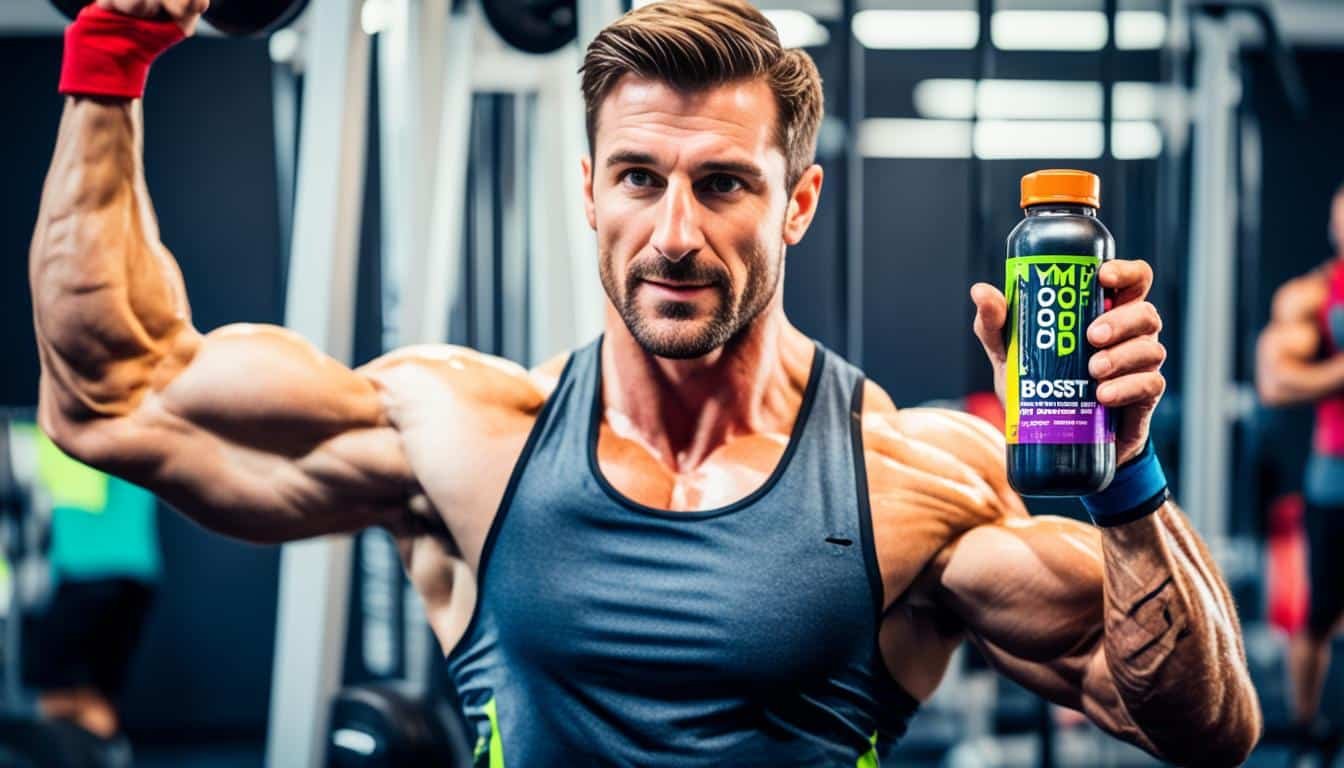Energy drinks for workout have gained popularity as a means to enhance exercise performance and increase intensity. These beverages are formulated to deliver a powerful boost of energy through caffeine and other stimulants. While they can provide temporary benefits during exercise, it’s important to understand their limitations and consider other factors for optimal performance.
Key Takeaways:
- Energy drinks for workout can boost exercise intensity through their caffeine and stimulant content.
- These beverages should not replace sports drinks that provide necessary fuel and electrolytes for hydration.
- Caffeine in energy drinks has been shown to improve endurance, strength, and muscle performance.
- Proper hydration with water and electrolyte-rich sports drinks is crucial for optimal athletic performance.
- Individualized hydration strategies and informed pre-workout fueling choices can enhance exercise performance.
The Difference Between Energy Drinks and Sports Drinks
When it comes to selecting the right beverage for your workout, understanding the difference between energy drinks and sports drinks is crucial. While both types of drinks can be consumed before or during exercise, they serve different purposes and provide distinct benefits.
Energy Drinks: Boost of Energy and Stimulants
Energy drinks, such as Red Bull and Monster, are specifically formulated to deliver a quick burst of energy. They often contain high amounts of caffeine and other stimulants, like taurine and guarana, which can help enhance alertness and mental focus. These beverages are popular among individuals looking for an immediate energy boost to power through their workouts.
“Energy drinks contain high amounts of caffeine and other stimulants, providing a rush of energy during exercise.”
Sports Drinks: Hydration and Electrolyte Replacement
In contrast, sports drinks like Gatorade and Powerade are designed to replenish fluids and electrolytes lost through sweat during endurance exercise. They typically contain a combination of water, sodium, sugars, and sometimes potassium. These ingredients help hydrate the body and restore electrolyte balance, supporting optimal performance and preventing dehydration during prolonged or intense workouts.
“Sports drinks are specifically formulated to replenish fluids and electrolytes lost during exercise, improving hydration and performance.”
The Importance of Electrolytes
Electrolytes, such as sodium and potassium, play a crucial role in maintaining proper hydration and supporting muscle function. During endurance exercise, electrolytes are lost through sweat, and their replenishment is essential to prevent muscle cramps, fatigue, and impaired performance.
The Role of Caffeine and Stimulants
Although energy drinks provide a quick and energizing boost, it’s important to note that they are not intended to replace lost fluids and electrolytes during exercise. The primary function of energy drinks is to deliver caffeine and other stimulants, which can temporarily increase alertness and improve focus.
However, excessive consumption of energy drinks can lead to dehydration due to their diuretic effects. It is recommended to consume sports drinks or plain water for hydration purposes during exercise.
| Energy Drinks | Sports Drinks |
|---|---|
| High amounts of caffeine and stimulants | Water, sodium, sugars, and sometimes potassium |
| Quick energy boost and increased alertness | Replenishment of fluids and electrolytes |
| Not intended for hydration during exercise | Improves hydration and endurance during exercise |
When deciding between energy drinks and sports drinks, it’s important to consider your specific needs and goals. If you’re looking for a quick burst of energy and mental focus, an energy drink may be suitable. However, if your priority is to stay hydrated and replenish electrolytes during endurance exercise, opting for a sports drink would be a better choice.
Remember, proper hydration and electrolyte balance are crucial for optimal performance and recovery. It’s always recommended to consult with a healthcare professional or registered dietitian to determine the best fueling strategy for your individual needs.
The Role of Caffeine in Energy Drinks
When it comes to energy drinks, one key ingredient stands out: caffeine. Caffeine is a natural stimulant that can have a significant impact on our performance during workouts and other physical activities. In fact, research has shown that caffeine can improve performance in endurance exercises and boost muscle strength and endurance.
When consumed in moderate doses, caffeine can have positive effects on exercise performance. The recommended dosage is around 5-6 mg per kilogram of body weight. However, it’s important to remember that caffeine should be consumed in moderation, as excessive intake can lead to negative side effects.
Caffeine is known for its ability to increase alertness, improve focus, and enhance physical performance. It works by stimulating the central nervous system, which can help athletes push harder and achieve better results during their workouts.
However, it’s crucial to be mindful of the source of caffeine and not rely solely on energy drinks for its intake. Caffeine can be found in various other products like coffee, tea, and certain foods. It’s important to consider your overall caffeine intake from all sources to avoid exceeding recommended limits.
Excessive caffeine consumption can have adverse effects on the body, including increased blood pressure, dehydration, jitters, and heart palpitations. So, while energy drinks can provide a quick energy boost, it’s important to consume them in moderation and be aware of your overall caffeine intake.
Benefits of Caffeine:
Here are some potential benefits of moderate caffeine consumption for exercise performance:
- Improved endurance: Caffeine has been shown to delay fatigue and help athletes push harder during prolonged exercise sessions.
- Increased focus and alertness: Caffeine can enhance mental alertness and focus, allowing athletes to stay more engaged during their workouts.
- Enhanced fat burning: Caffeine has thermogenic properties, meaning it can increase the body’s ability to burn fat for fuel during exercise.
- Better muscle strength and power: Caffeine can improve muscle strength and power output, leading to more productive workouts.
While caffeine can be beneficial for exercise performance, it’s important to find the right balance and consider individual tolerance levels. It’s a good idea to experiment with different caffeine levels during training to determine what works best for you.
“Caffeine can provide a valuable boost to exercise performance when consumed in moderation. However, it’s important to be cautious of excessive caffeine intake and consider individual tolerance levels.” – Dr. John Dawson, Sports Scientist
So, while caffeine in energy drinks can help improve performance, it should be consumed mindfully and as part of an overall well-balanced approach to nutrition and exercise.
Tips for Consuming Caffeine:
Here are a few tips to keep in mind when consuming caffeine for exercise performance:
- Stay hydrated: Caffeine can have a diuretic effect, so it’s important to consume enough fluids to stay properly hydrated during exercise.
- Be aware of total caffeine intake: Consider all sources of caffeine in your diet, including energy drinks, coffee, tea, and chocolate, to ensure you’re not exceeding recommended limits.
- Timing is key: It’s best to consume caffeine about 30-60 minutes before your workout to allow for optimal absorption and performance enhancement.
- Start with smaller doses: If you’re new to consuming caffeine before exercise, start with smaller doses and gradually increase to assess your tolerance.
By following these tips and being mindful of your caffeine intake, you can maximize the benefits of caffeine for exercise performance while minimizing any potential risks.

| Caffeine Content in Popular Energy Drinks | Caffeine Amount (mg) |
|---|---|
| Red Bull | 80 mg |
| Monster | 160 mg |
| Rockstar | 160 mg |
The Importance of Hydration During Exercise
Staying properly hydrated before, during, and after exercise is crucial for optimal athletic performance. Dehydration can lead to a decrease in physical and cognitive performance, as well as a higher risk of heat-related illnesses. While the sensation of thirst may arise during exercise, it is not always an accurate indicator of hydration status. It is essential to have a proactive approach to hydration to ensure you maintain adequate fluid levels throughout your workout.
Pre-hydration is key to starting exercise in an optimal fluid balance. The American College of Sports Medicine (ACSM) recommends pre-hydrating by consuming approximately 5-6 milliliters of fluid per kilogram of body weight at least four hours before exercise. This practice helps ensure that you begin your workout in a hydrated state, giving you a head start in maintaining your fluid balance.
During exercise, fluid replacement is essential to compensate for the water lost through sweat. The ACSM advises consuming a fluid replacement beverage, such as a sports drink, during longer or more intense exercise sessions. Sports drinks are formulated to replace not only fluids but also electrolytes lost through sweat. The optimal timing and amount of fluid replacement may vary depending on factors such as exercise duration, intensity, and individual sweat rate.
After your workout, it is crucial to continue replenishing fluids to restore hydration levels. The ACSM recommends slowly consuming 1.5 liters of fluid for each kilogram of body weight lost during exercise. This gradual rehydration strategy allows for the body to rehydrate effectively without overloading the system.
It’s important to note that everyone’s hydration needs are unique, and they can vary based on factors such as body size, fitness level, and environmental conditions. Monitoring your body weight before and after exercise can provide insight into your individual fluid loss and guide your hydration strategies. Additionally, paying attention to personal thirst cues and addressing them promptly can help maintain hydration during and after exercise.
Hydration Strategies for Exercise
Here are some practical strategies for staying properly hydrated during exercise:
- Start your workout in a hydrated state by pre-hydrating with 5-6 milliliters of fluid per kilogram of body weight at least four hours before exercise.
- During longer or more intense exercise, choose a fluid replacement beverage, such as a sports drink, to replenish fluids and electrolytes.
- Consume fluids gradually after exercise, aiming for 1.5 liters of fluid for each kilogram of body weight lost during exercise.
- Listen to your body’s thirst cues and drink when you feel the need. Don’t rely solely on thirst as it may not accurately reflect your hydration status.
- Monitor your body weight before and after exercise to assess your individual fluid loss and adjust your hydration strategies accordingly.
By following these hydration strategies, you can optimize your exercise performance, maintain fluid balance, and reduce the risk of dehydration-related complications.
| Pre-hydration | During Exercise | Post-exercise | |
|---|---|---|---|
| Fluid Recommendations | 5-6 milliliters of fluid per kilogram of body weight at least four hours before exercise | Fluid replacement beverage (e.g., sports drink) during longer or more intense exercise | Slowly consume 1.5 liters of fluid for each kilogram of body weight lost during exercise |
| Benefits | Optimal starting fluid balance | Replenishment of fluids and electrolytes | Restoration of hydration levels |
| Considerations | Individual needs may vary based on factors such as body size and fitness level | Fluid replacement may vary based on exercise duration, intensity, and sweat rate | Gradual rehydration prevents overloading the system |
The Effects of Caffeine and Sugar in Energy Drinks
While caffeine can enhance performance, it is important to be cautious of the sugar content in energy drinks, especially for those trying to manage their weight. Energy drinks often contain high amounts of added sugar, which can contribute to excessive calorie intake and hinder weight loss efforts. Balancing caffeine intake with other caffeinated beverages, limiting daily caffeine intake to recommended amounts, and choosing energy drinks with no or low sugar options can help avoid potential negative effects on weight management.
Pre-Workout Supplements vs. Energy Drinks
When it comes to optimizing performance, especially during higher intensity activities, pre-workout supplements are considered a better choice compared to energy drinks. While energy drinks may provide temporary energy and caffeine, pre-workout supplements offer additional ingredients that can enhance focus, fight fatigue, and improve muscle strength and endurance.
- L-theanine: This amino acid, commonly found in pre-workout supplements, works in conjunction with caffeine to improve focus and attention during workouts.
- Beta-alanine: By increasing carnosine levels, beta-alanine helps fight fatigue, allowing you to push through intense workouts.
- Creatine: Known for its ability to increase lean mass and enhance strength when combined with proper training, creatine is a popular ingredient in pre-workout supplements.
By incorporating these ingredients, among others like phosphatidylserine and L-citrulline, pre-workout supplements can help optimize workouts and improve overall performance.
Also Read:- Elevate Your Energy Safely: A Guide To Energy Drinks For Diabetics
When choosing pre-workout supplements, it is important to select those that are formulated with evidence-based ingredients and follow recommended dosage guidelines to ensure safety and efficacy.

| Criteria | Pre-Workout Supplements | Energy Drinks |
|---|---|---|
| Targeted Performance Enhancement | Yes | Yes |
| Fight Fatigue | Yes | Yes |
| Enhance Focus | Yes | Yes |
| Improve Muscle Strength and Endurance | Yes | No |
| Contains Evidence-Based Ingredients | Yes | No |
| Hydration Benefits | No | No |
Note: This table provides a general comparison between pre-workout supplements and energy drinks and does not encompass all products or variations available on the market.
The Benefits of Specific Pre-Workout Ingredients
When it comes to maximizing your workout performance, incorporating specific ingredients into your pre-workout routine can make a significant difference. Ingredients like L-theanine, beta-alanine, creatine, and others found in pre-workout supplements can help optimize your workouts and improve overall performance.
L-theanine
L-theanine, an amino acid found primarily in tea leaves, can work in synergy with caffeine to enhance focus and attention during workouts. By promoting a state of relaxed alertness, L-theanine can help you stay mentally sharp and engaged throughout your exercise routine.
Beta-alanine
Beta-alanine is a naturally occurring amino acid that helps fight fatigue and enhance endurance. During intense exercise, the body produces muscle acids that can impair performance. Beta-alanine increases carnosine levels in the muscles, which acts as a buffer against these acids, allowing you to sustain higher levels of exertion for longer periods.
Creatine
Creatine is a popular ingredient in pre-workout supplements known for its ability to increase lean muscle mass and enhance strength. It works by replenishing the body’s primary energy source, ATP (adenosine triphosphate), which can help improve performance and facilitate more rigorous training.
These are just a few examples of the beneficial ingredients found in pre-workout supplements. Other ingredients like phosphatidylserine and L-citrulline can also play a role in optimizing workouts and improving performance.
Remember to consult with a healthcare professional or registered dietitian before incorporating any new supplements into your routine to ensure they align with your individual needs and goals.
By harnessing the power of these ingredients, you can supercharge your workouts and take your exercise performance to the next level.

Considerations and Potential Risks of Caffeine and Supplement Use
When it comes to caffeine intake and supplement use, it’s important to be mindful of potential risks and make informed choices. While caffeine can provide a temporary energy boost and enhance performance, excessive consumption can have adverse effects on the body. Some potential risks associated with caffeine include:
- Jitteriness and restlessness
- Tolerance, which may lead to the need for higher doses to achieve the same effects
- Caffeine overdose, characterized by symptoms such as rapid heartbeat, nausea, and dizziness
It’s crucial to be aware of the caffeine content in various sources such as energy drinks, coffee, tea, and chocolate, to avoid exceeding recommended daily limits. Gradually reducing caffeine intake or opting for decaffeinated alternatives can help mitigate these risks.
Additionally, when considering supplements, it’s important to recognize that not all supplements are necessary or effective for every individual. Consulting with a healthcare professional or registered dietitian is recommended to determine if specific supplements are suitable for individual needs and goals. They can provide personalized guidance and address any potential risks or interactions with medications.
Remember, making informed choices and seeking professional advice can help ensure the safe and effective use of caffeine and supplements to support your fitness journey.
The Need for Individualized Hydration Strategies
When it comes to hydration during exercise, there is no one-size-fits-all approach. Hydration needs can vary among individuals based on factors such as body weight, sweat rate, and exercise intensity. It is crucial to have an individualized approach to fluid replacement to ensure optimal performance and prevent dehydration.
One effective method to determine fluid replacement needs is to monitor weight changes before and after exercise. By measuring weight loss during workouts, you can assess how much fluid needs to be replaced. For example, a 1-pound weight loss corresponds to approximately 16 ounces (473 milliliters) of fluid. However, it is essential to note that weight loss during exercise can also be due to factors like glycogen depletion and fuel utilization.
Additionally, paying attention to personal thirst cues is crucial for maintaining proper hydration. Thirst is a reliable indicator that the body needs fluids. Ignoring thirst or waiting until you are extremely thirsty can lead to inadequate hydration and impaired performance. Make sure to drink fluids before, during, and after exercise, even if you do not feel thirsty.
Furthermore, it is important to understand that hydrating solely with water may not be sufficient, especially during prolonged or intense exercise sessions. Electrolyte-rich beverages, such as sports drinks, can help replenish electrolytes lost through sweat and aid in fluid absorption. These drinks also provide carbohydrates for energy replenishment.
“Hydration needs can vary among individuals, and there is no one-size-fits-all approach to hydration during exercise.”
Here is an example of a table comparing the general fluid replacement recommendations for different exercise durations:
| Exercise Duration | Fluid Replacement Recommendations |
|---|---|
| Less than 60 minutes | Water is generally sufficient |
| 60-90 minutes | Sports drinks with 6-8% carbohydrates and electrolytes |
| More than 90 minutes | Sports drinks with 6-8% carbohydrates, electrolytes, and possibly protein |
Remember, this table is a general guideline, and individual needs may vary. It is vital to adjust fluid intake based on sweat rate, climate, and personal preferences. Consulting with a registered dietitian or sports nutritionist can help develop an individualized hydration plan tailored to your specific needs and goals.

Making Informed Choices for Pre-Workout Fueling
When it comes to pre-workout fueling, it is crucial to make informed choices that align with your individual needs and goals. While energy drinks may provide a quick energy boost, they are not designed to replace lost fluids and electrolytes during exercise. To optimize your exercise performance, it is recommended to consider sports drinks or pre-workout supplements that are formulated with evidence-based ingredients.
Opting for sports drinks that contain essential electrolytes and carbohydrates can help replenish fluids and provide necessary fuel for your workout. These drinks, such as Gatorade or Powerade, are specifically designed to enhance endurance and hydration during physical activity.
Alternatively, pre-workout supplements offer a targeted approach to optimizing exercise performance. These supplements often contain a combination of ingredients that have been scientifically proven to enhance endurance, strength, and focus. Examples include L-theanine, beta-alanine, and creatine.
Benefits of Pre-Workout Ingredients:
- L-theanine: Working in conjunction with caffeine, L-theanine improves focus and attention during workouts.
- Beta-alanine: This ingredient helps fight fatigue by increasing carnosine levels, which buffers muscle acids produced during exercise.
- Creatine: Known for increasing lean muscle mass and enhancing strength, creatine can be an effective addition to a proper training routine.
By carefully selecting pre-workout supplements that contain evidence-based ingredients, you can make informed decisions that will positively impact your exercise performance. It is crucial to follow the recommended dosage guidelines and consult with a healthcare professional or registered dietitian if you have any specific concerns or questions.
Remember, both sports drinks and pre-workout supplements can complement your exercise routine and help you achieve your fitness goals. However, individual preferences and tolerances may vary, so it’s essential to find the option that works best for you.

| Nutrient | Sports Drinks | Pre-Workout Supplements |
|---|---|---|
| Fluid Replacement | ✓ | – |
| Electrolytes | ✓ | – |
| Caffeine | – | ✓ |
| L-theanine | – | ✓ |
| Beta-alanine | – | ✓ |
| Creatine | – | ✓ |
Conclusion
In conclusion, energy drinks have gained popularity as a means to enhance exercise performance. These drinks can provide a temporary boost of energy and improve workout intensity through the effects of caffeine and other stimulating ingredients. However, it is important to note that energy drinks should not be relied upon for hydration during exercise, as they do not supply the necessary fluids and electrolytes required by the body.
To optimize exercise intensity and overall workout performance, it is recommended to make informed choices. Instead of solely relying on energy drinks, consider opting for pre-workout supplements that contain evidence-based ingredients. Following the recommended dosage guidelines can ensure safe and effective use.
Additionally, proper hydration remains key for optimal results. It is crucial to stay hydrated before, during, and after exercise. This can be achieved by consuming fluids that contain the necessary electrolytes and maintaining an individualized approach based on factors such as body weight, sweat rate, and exercise intensity. By making mindful choices and staying properly hydrated, individuals can optimize their exercise performance and achieve their fitness goals.
FAQs
Q: What are the best energy drinks for workout?
A: Some of the best energy drinks for workout include C4, C4 Smart Energy, Celsius, and ZOA, which are known for their natural energy-boosting ingredients and zero sugar content.
Q: How can energy drinks improve physical performance during exercise?
A: Energy drinks can improve physical performance during exercise by providing a combination of natural caffeine, BCAAs (branched-chain amino acids), and other ingredients that help boost energy levels and enhance endurance.
Q: Are there any natural energy drinks available for workouts?
A: Yes, there are natural energy drinks available for workouts, such as C4 Smart Energy, which are formulated with natural ingredients like green tea extract, natural caffeine, and nootropics to provide a sustainable energy boost.
Q: What are the key benefits of consuming non-carbonated energy drinks for workouts?
A: Non-carbonated energy drinks for workouts offer benefits such as providing essential energy without the carbonation, which can be more suitable for individuals looking for a smoother, sugar-free energy boost.
Q: How do energy drinks with zero sugar contribute to high-intensity workouts?
A: Energy drinks with zero sugar contribute to high-intensity workouts by providing a source of energy from natural ingredients without the added calories, fructose, or artificial flavors, allowing for a cleaner energy boost.
Q: What role do B vitamins play in energy drinks for workout?
A: B vitamins in energy drinks for workout play a crucial role in supporting energy metabolism and overall physical performance, making them an essential component of pre-workout energy drinks like C4 Energy.
Q: Are there any energy drinks specifically designed for endurance and extra boost during workouts?
A: Yes, there are energy drinks like C4 Energy that are specifically designed to provide endurance and an extra boost during workouts, thanks to ingredients like beta-alanine, citrulline, and additional natural caffeine for sustained energy.





